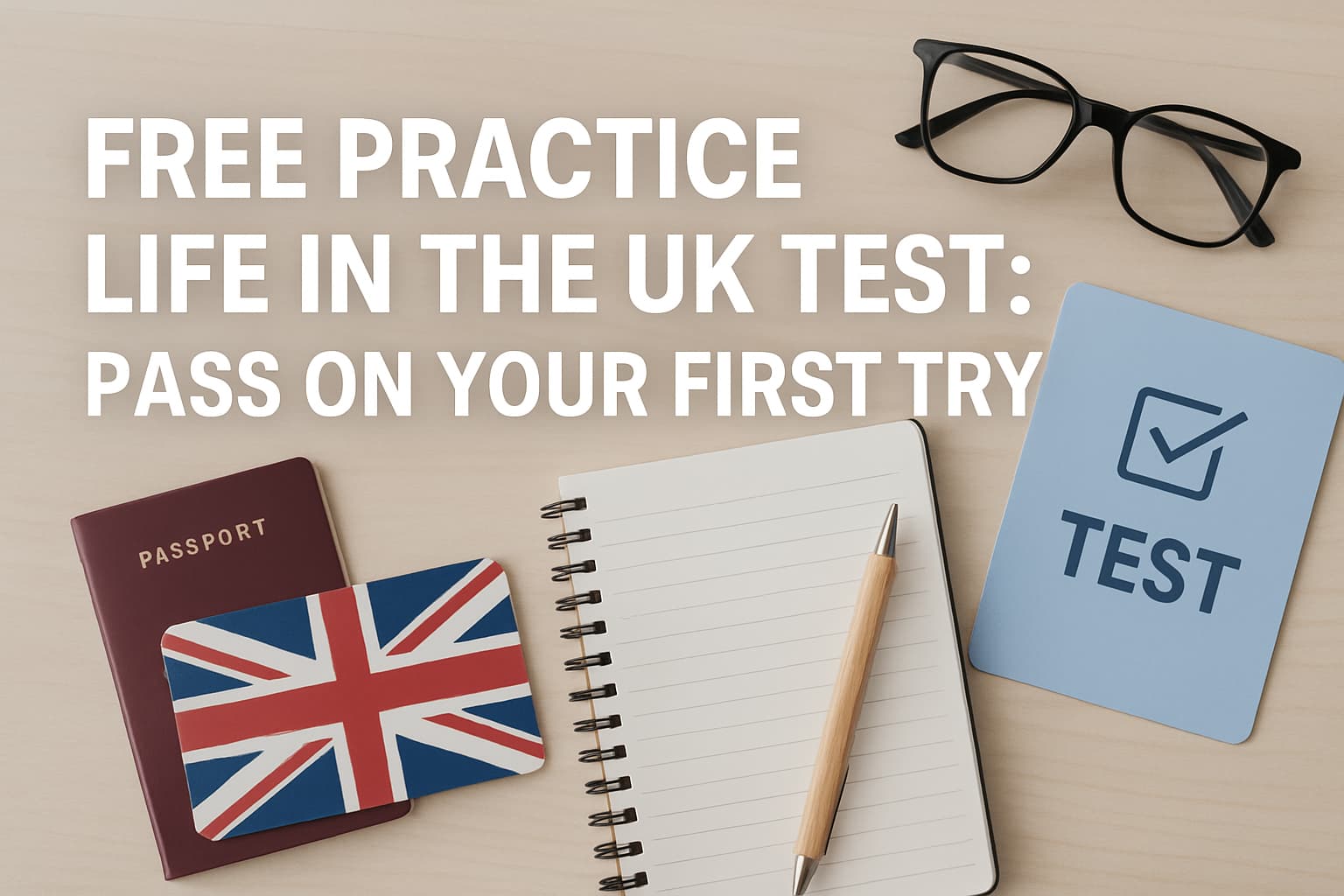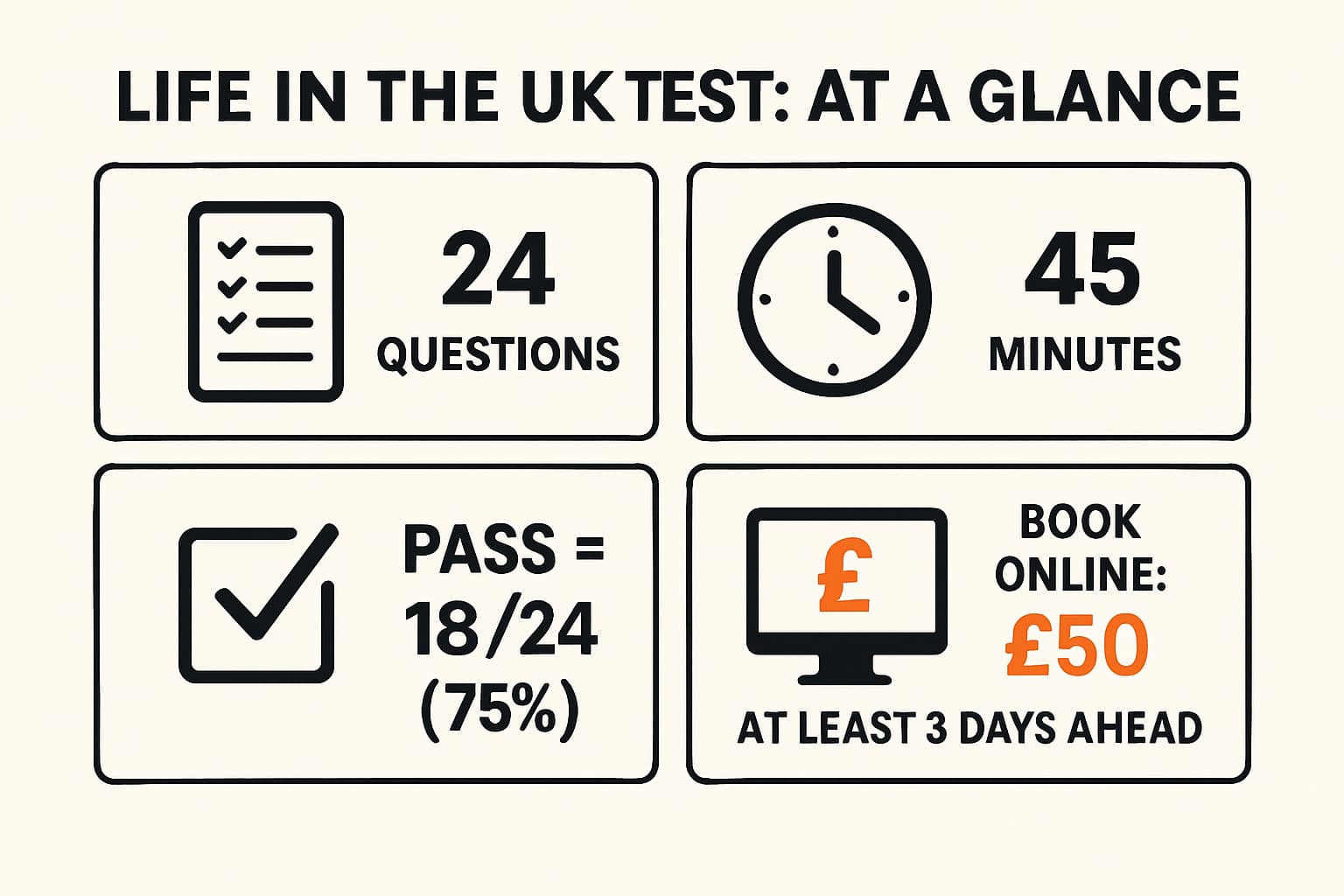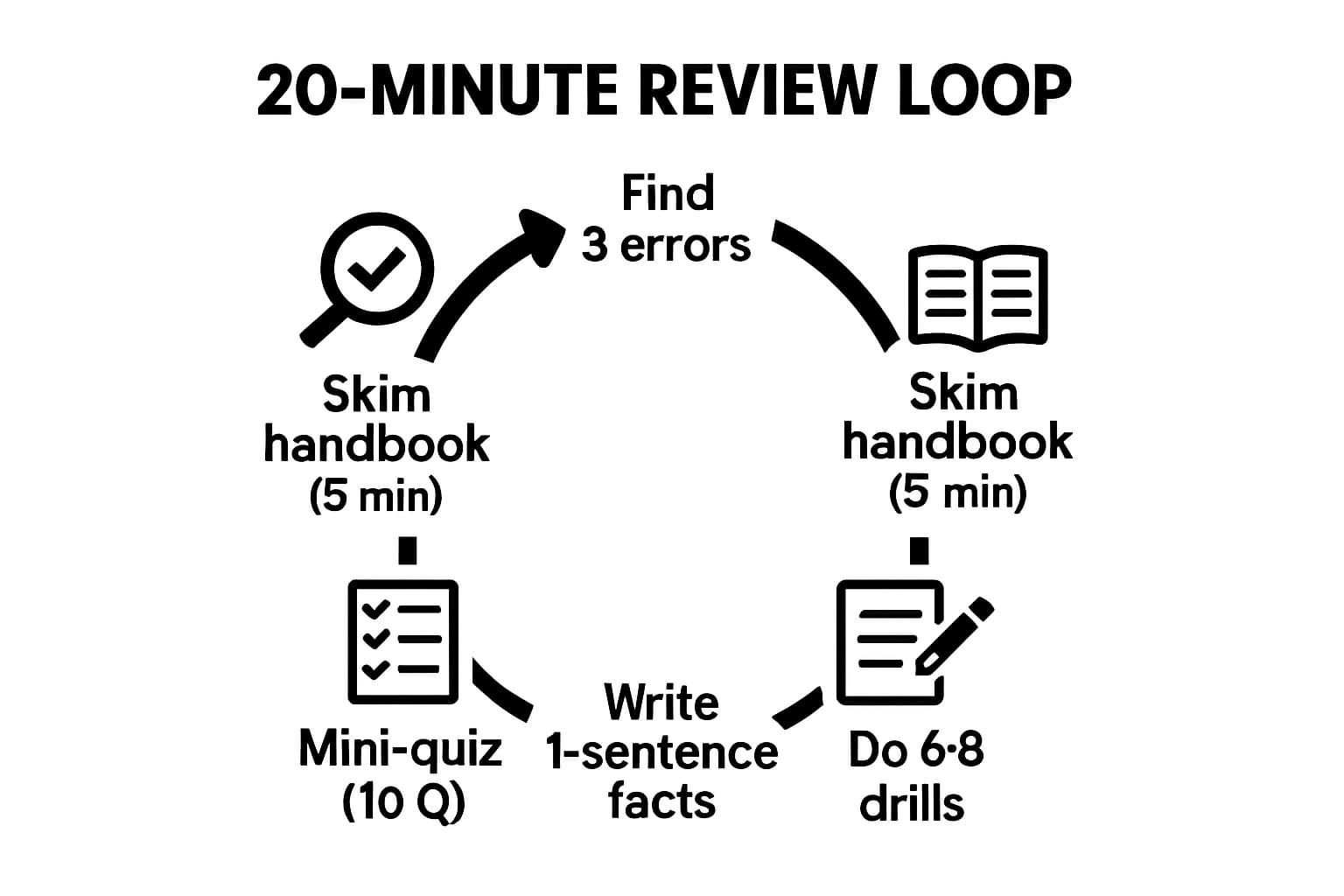Free practice Life in the UK test: pass on your first try

Nail the Life in the UK Test on your first attempt. Below, you’ll find two realistic free mock tests with answer explanations, topic drills by chapter, and a fast review loop — all aligned to the official handbook and updated for 2025.
Use this page to practice immediately, then upgrade to structured prep when you are ready.
What you’ll get here (fast-start, 2025-ready)
Jump straight into a free practice Life in the UK test and focused drills. Here’s how to use this page effectively:
Start with Mock Test A to set your baseline under light time pressure.
Review the answer explanations to fix gaps fast.
Take Mock Test B to validate progress with fresh questions.
Use the chapter-based drills to target weak areas.
Track your score against our readiness rubric (aim for 21+/24 consistently).
Want a step-by-step practice plan? See our Life in the UK Test practice guide.
Life in the UK Test 2025: format, scoring, updates
Official format:
24 multiple-choice questions
45 minutes to finish
Pass mark: 75% (at least 18 correct)
These facts come directly from GOV.UK: see what happens on test day and the official caseworker guidance.
2025 updates: The Life in the UK Test format remains the same. However, English language testing arrangements for certain visa routes are changing from 1 January 2025 (LANGUAGECERT ESOL SELT 4-skills replaced by LanguageCert Academic SELT and LanguageCert General SELT). See the UK guidance on SELT updates. The government has also signalled higher English thresholds (from B1 to B2) for some routes, including ILR in most cases; see analysis from DavidsonMorris. Always check GOV.UK for the latest.
Practice tip: Train under 24-minute conditions on this page to build a comfort buffer, then take full-length 45-minute mocks to simulate the real exam.

Start here: Free Mock Test A (24 minutes)
Simulate exam conditions: quiet room, no notes, set a timer for 24 minutes to train pacing (the real test gives 45 minutes). Mark your choices A–D. Do not check answers until the end.
Begin Test A (24 questions)
How many countries make up the United Kingdom?
A. 3 B. 4 C. 5 D. 6What is the capital city of Wales?
A. Belfast B. Edinburgh C. Cardiff D. SwanseaThe Union Flag combines the crosses of which patron saints?
A. George, David, Andrew B. George, Andrew, Patrick C. David, Patrick, Andrew D. George, David, PatrickIn which year was Magna Carta agreed?
A. 1066 B. 1215 C. 1314 D. 1707The Battle of Hastings took place in:
A. 1215 B. 1485 C. 1066 D. 1688Who is the patron saint of Scotland?
A. St George B. St Andrew C. St David D. St PatrickWho leads the UK government?
A. The Monarch B. The Speaker C. The Prime Minister D. The Lord ChancellorWhat is the minimum age to vote in UK general elections?
A. 16 B. 17 C. 18 D. 21Which wall did the Romans build in the north of England?
A. Offa's Dyke B. Antonine Wall C. Hadrian's Wall D. Roman DykeWho introduced the first printing press to England?
A. Geoffrey Chaucer B. William Caxton C. Samuel Pepys D. Thomas MoreThe UK Parliament is made up of:
A. Commons and the Monarch only B. Lords and the Monarch only C. Commons and Lords D. Commons, Lords and the MonarchHow many people usually serve on a jury in England and Wales?
A. 10 B. 12 C. 15 D. 24Who can vote in a UK general election?
A. UK citizens only B. UK and EU citizens C. British, Irish and qualifying Commonwealth citizens aged 18+ resident in the UK D. Anyone living in the UK aged 18+What is the national flower of Wales?
A. Rose B. Thistle C. Daffodil D. ShamrockWhere are the Crown Jewels kept?
A. Buckingham Palace B. Tower of London C. Windsor Castle D. Westminster AbbeyWhat is the currency of the UK?
A. Euro B. Pound sterling C. US dollar D. Scottish poundHow is the BBC mainly funded?
A. Council tax B. Advertising C. Licence fee D. DonationsWhen is St George's Day?
A. 1 March B. 17 March C. 23 April D. 30 NovemberWho was the first woman to be Prime Minister of the UK?
A. Theresa May B. Margaret Thatcher C. Nicola Sturgeon D. Mary RobinsonWhat is the established church in England?
A. Church of Scotland B. Church of England C. Roman Catholic Church D. Baptist ChurchWhere does the Prime Minister live and work?
A. 11 Downing Street B. 1 Parliament Street C. 10 Downing Street D. Buckingham PalaceWhich sport hosts the Wimbledon Championships?
A. Cricket B. Tennis C. Rugby D. FootballIf you fail the Life in the UK Test, what happens?
A. Wait 6 months, then free retake B. Retake as many times as needed, paying each time C. One appeal only D. Two free retakesWhat is the official time and number of questions for the Life in the UK Test?
A. 20 questions, 20 minutes B. 24 questions, 24 minutes C. 24 questions, 45 minutes D. 30 questions, 45 minutes
Answers and explanations for Test A
B. Four countries: England, Scotland, Wales, Northern Ireland.
C. Cardiff is the capital of Wales.
B. St George (England), St Andrew (Scotland), St Patrick (Northern Ireland).
B. Magna Carta was agreed in 1215.
C. The Norman conquest began in 1066.
B. St Andrew is Scotland’s patron saint.
C. The Prime Minister leads the government.
C. Voting age is 18 for UK general elections.
C. Hadrian’s Wall marked the Roman frontier.
B. William Caxton set up England’s first printing press.
D. Parliament comprises Commons, Lords and the Monarch.
B. A jury normally has 12 members.
C. British, Irish and qualifying Commonwealth citizens aged 18+ resident in the UK can vote in general elections.
C. The daffodil is a symbol of Wales.
B. The Crown Jewels are at the Tower of London.
B. The UK uses the pound sterling (GBP).
C. The BBC is funded mainly by the TV licence fee.
C. St George’s Day is on 23 April.
B. Margaret Thatcher (1979) was the first woman PM.
B. The Church of England is the established church in England.
C. 10 Downing Street is the PM’s official residence.
B. Wimbledon is tennis.
B. You can rebook as many times as needed, but you must pay each time (GOV.UK).
C. 24 questions, 45 minutes (GOV.UK).
Take Free Mock Test B (new 2025 items)
New styles, same official standards. Use this to verify improvement after reviewing Test A explanations.
Begin Test B (24 questions)
Which country is not part of the UK?
A. Scotland B. Wales C. Republic of Ireland D. Northern IrelandWhat does the term "the Troubles" refer to?
A. English Civil War B. Conflict in Northern Ireland late 1960s–1998 C. Industrial disputes in the 1970s D. WWI Western FrontThe Good Friday Agreement was signed in:
A. 1972 B. 1981 C. 1998 D. 2005Where is the Scottish Parliament located?
A. Glasgow Green B. Holyrood, Edinburgh C. Aberdeen D. StirlingWho is responsible for the UK’s economic and financial matters?
A. Home Secretary B. Chancellor of the Exchequer C. Foreign Secretary D. Defence SecretaryWhat is the role of a Member of Parliament (MP)?
A. To serve on juries B. To represent a constituency in the House of Commons C. To enforce laws D. To manage local councilsWhich two are British inventions?
A. Steam locomotive and World Wide Web B. Printing press and telephone C. Radio and piano D. Microscope and telescopeWho became the first monarch of both England and Scotland in 1603?
A. Henry VIII B. Elizabeth I C. James I (VI of Scotland) D. Charles IWhich is a core responsibility of residents in the UK?
A. Voting in all elections B. Respecting and obeying the law C. Joining a political party D. Serving in the armed forcesWhat is a referendum?
A. A type of court B. A national opinion poll C. A vote in which everyone of voting age can take part on a single issue D. A censusWhen do people in the UK commemorate those who died in wars?
A. 5 November B. The Sunday closest to 11 November C. 25 December D. 1 JanuaryWhere is the Senedd (Welsh Parliament) based?
A. Cardiff Bay B. Bangor C. Swansea D. NewportMagistrates (Justices of the Peace) are:
A. Full-time judges B. Volunteers who hear minor cases in local courts C. Police officers B. Lawyers for the CrownWho forms the UK government after a general election?
A. The largest party in the House of Lords B. The party with the most seats in the House of Commons C. The party with the most votes nationwide D. The Monarch’s chosen partyIn which languages can people take the Life in the UK test in devolved nations?
A. Any EU language B. English or Welsh in Wales; English or Scottish Gaelic in Scotland C. English only everywhere D. English or Irish Gaelic in Northern IrelandHow much does the Life in the UK test cost and how do you book?
A. £25, pay at the centre B. £50, book online via GOV.UK C. £75, book by phone D. Free with citizenship applicationHow far in advance must you book the test?
A. Same day B. 24 hours C. At least 3 days D. 2 weeks exactlyApproximately how many test centres are there in the UK?
A. 10 B. Over 30 C. 100 D. 300What ID rule applies on test day?
A. Any photo will do B. Name on booking must exactly match the ID C. Photocopies accepted D. Student cards onlyWhat score is needed to pass the Life in the UK test?
A. 70% B. 75% C. 80% D. 90%If you fail the test:
A. One free retake B. Retake as many times as needed, paying each time C. Must wait 1 year D. Appeal to the centreWho wrote Pride and Prejudice?
A. Charlotte Bronte B. Jane Austen C. Charles Dickens D. George EliotThe union of England and Scotland created the Kingdom of Great Britain in:
A. 1603 B. 1689 C. 1707 D. 1801The UK is a constitutional monarchy and a:
A. Direct democracy B. Presidential republic C. Parliamentary democracy D. Dictatorship
Answers and explanations for Test B
C. The Republic of Ireland is a separate country.
B. The Troubles refers to the Northern Ireland conflict.
C. The Good Friday Agreement was in 1998.
B. The Scottish Parliament sits at Holyrood in Edinburgh.
B. The Chancellor oversees the Treasury and the economy.
B. MPs represent constituencies in the Commons.
A. The steam locomotive and the World Wide Web originated in Britain.
C. James I of England (VI of Scotland) united the crowns in 1603.
B. Respecting and obeying the law is a key civic responsibility.
C. A referendum is a single-issue vote of the electorate.
B. Remembrance Sunday is the Sunday closest to 11 November.
A. The Senedd is in Cardiff Bay.
B. Magistrates are trained volunteers hearing less serious cases.
B. The government is formed by the party with most Commons seats.
B. Welsh in Wales and Scottish Gaelic in Scotland are permitted options (official guidance).
B. £50, book online through GOV.UK (booking page).
C. Book at least 3 days in advance (GOV.UK).
B. There are over 30 centres (GOV.UK).
B. Your booking name must exactly match your photo ID (GOV.UK).
B. You must score 75% or more to pass (GOV.UK).
B. You can retake as many times as needed, paying each time (GOV.UK).
B. Jane Austen authored Pride and Prejudice.
C. The Acts of Union in 1707 created Great Britain.
C. The UK is a parliamentary democracy.
Topic drills: free practice by chapter
Use these quick drills to target weak areas. For deeper study, see our Life in the UK Test Study Guide.
Values, traditions, symbols
Which animal is on the royal coat of arms for England? A. Lion B. Unicorn C. Dragon D. Stag
St David’s Day is on: A. 23 April B. 1 March C. 30 November D. 17 March
Which flower represents Northern Ireland? A. Rose B. Shamrock C. Thistle D. Daffodil
Timeline and history highlights
When did the Black Death reach Britain? A. 1066 B. 1215 C. 1348–49 D. 1642
Who led Britain in WWII as Prime Minister? A. Neville Chamberlain B. Winston Churchill C. Clement Attlee D. Harold Macmillan
Which event is called the Glorious Revolution? A. 1688 B. 1715 C. 1745 D. 1805
Government, law, and your role
How often must general elections be held at most? A. Every 3 years B. Every 4 years C. Every 5 years D. Every 10 years
How many nations have devolved administrations? A. 1 B. 2 C. 3 D. 4
Who chairs debates in the House of Commons? A. The PM B. The Speaker C. The Lord Chancellor D. The Monarch
Everyday life, culture, and society
What is the legal age to drive a car in the UK (most cases)? A. 16 B. 17 C. 18 D. 21
Which is a UK public service broadcaster? A. BBC B. CNN C. Fox News D. ABC
Which sport uses a bat and a ball and is played in Test matches? A. Rugby B. Cricket C. Tennis D. Football
Score yourself: convert your result to readiness
Use this simple rubric to interpret your mock scores and plan next steps.
23–24/24: Test-ready. Book your test if not already booked. Maintain with one mock per day.
21–22/24: Nearly there. Target weak topics with chapter drills for 2–3 days.
18–20/24: Borderline. Use the 20-minute review loop below for 3–5 cycles, then retest.
Below 18/24: Rebuild fundamentals. Re-read key handbook chapters and do targeted quizzes first.
Track improvement over three sessions. If your average is 21+ with no topic below 70%, you’re on the right path.
Fix weak areas fast: 20‑minute review loop
Identify your 3 worst questions from the last mock.
Re-read the relevant handbook points (5 minutes total).
Do 6–8 targeted drill questions on that topic.
Write a one-sentence summary per fact you missed.
Retest with a 10-question mini-quiz. Repeat daily.
For a complete method, follow our expert first-time pass plan.

Upgrade your prep: Life in the UK Test App
If you want structured learning that adapts to you, the Life in the UK Test App is built to maximise first-time pass rates without overwhelm.
How the app boosts first‑time pass rates
Brit‑Bear smart assistant personalises your study path and flags weak topics automatically.
650+ expertly written questions with clear explanations to lock in knowledge.
Readiness score shows when you’ve reached 21+/24 consistently.
Offline access for learning anywhere, anytime.
Mock tests + Hard Mode remove clues and tighten timing to simulate the real exam.
Simulate the real exam with Hard Mode
Hard Mode hides obvious cues, mixes topics aggressively, and shortens time to build calm under pressure — so the 45-minute official test feels comfortable.
Download and start
Ready for guided prep that saves time and avoids retake fees?
Download on App Store: iOS link
Get it on Google Play: Android link
FAQs: free vs official, older years, online rules
Quick answers to common questions about free practice and official requirements.
Is free practice enough to pass? Many pass with free mocks plus disciplined review. Structured apps help you reach 21+/24 faster with tracking and targeted drills.
What changed from 2023/2024 to 2025? The Life in the UK test format is unchanged. English language testing routes are updating in 2025; check SELT guidance.
Can I take the test online? You must book online and take the test in person at a centre. There are over 30 centres in the UK.
What ID rules apply? Bring the correct photo ID. The booking name must exactly match the ID. No refund if you bring the wrong ID or refuse a photo (GOV.UK).
Who needs to take the test? Most applicants for ILR or citizenship must meet both language and knowledge requirements unless over 65 or medically exempt (official guidance).
What should I study? The test is based on Life in the United Kingdom: A Guide for New Residents. Align your practice to this handbook.
Exam‑day checklist and quick tips
Follow this to stay calm and focused.
Booking: Book online at least 3 days ahead; choose a centre near you. Cost is £50.
ID: Bring the exact ID you used to book; ensure the name matches perfectly.
Timing: Arrive 15–20 minutes early. The test is 45 minutes for 24 questions.
Mindset: Read each question twice, eliminate two wrong answers, then choose the best remaining.
Review: Flag unsure questions; return if time remains.
After: You’ll receive your result on the day at the centre. Keep your pass notification safe.
New to booking? Follow our step‑by‑step booking guide and avoid the most common mistakes.